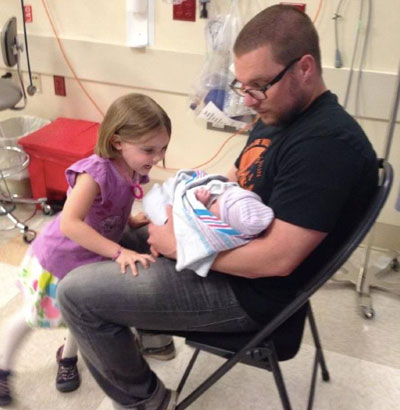
|
I have two daughters. Norah is 4 and Aspen is just 3 months. Their lives look very different than mine did as a child. My father left when I was a 9 years old. I was raised half by my single mother, and half by my widowed grandmother. When I got married, I didn’t know much about what it meant to be in a good marriage and I had to learn a lot of things through trial and error. Even at their young age, I think a lot about my daughters’ future and whether I’m setting a better example than the one I had. Below is a list of things I’ve learned about marriage that I’d like them to know. (Author’s Note: I know that views on marriage are changing. This list is based on my own experience in a straight marriage because it’s all I know.) Don’t let your husband pressure you into sex: Most likely your husband will want sex more than you expect. Don’t let your husband pressure you into things you are not comfortable with. Talk openly about sex with him. Discuss your expectations and try hard to understand his. Although sex is important, be sure that you both realize that it is only one part of your marriage, it isn’t the whole marriage. Don’t lower your expectations of your husband after marriage. Raise them: After marriage, it’s easy to get comfortable. I’ve never understood why this happens, because marriage is the hardest thing I’ve ever done. It’s easy to let things slide after marriage. To expect fewer dates, fewer flowers, fewer love letters. Don’t. In fact, expect more and you will get it. And do the same for him. Once you have children, those little trinkets of affection may be the only things that keep your marriage above water. Tell him what you want as frankly, and plainly as possible: I know this sounds cliché, but men and women communicate differently. Most men speak plainly. They like the obvious to be spelled out. Rather than hoping that he will pick up on your hints, say things like, “Take me out more,” or “Don’t give me an answer, just listen to me for a while because I need to vent,” or “I’m really frustrated with the kids. It’s not you. Just let me be alone for a while and I will be fine.” Sometimes the house will be a mess and it’s his fault, too: When I say sometimes, I mean most of the time. Especially after you have kids. He has as much of an obligation to clean the house as you do, so tell him to stop complaining and do the laundry. Sometimes it will feel like he’s stomping on your feelings, when in fact he’s just wandering blindly: Your husband is going to forget to do things. A lot of things. He’s going to say stupid things, too. Give him the benefit of the doubt. Realize that most likely his actions or statements were not malicious. He didn’t intend to hurt you or not do something on purpose. Don’t allow him to tell you your place or define your aspirations: When you get married, you may want to be a stay-at-home mom. Five years into marriage, you my decide you want to become a lawyer. Or perhaps when you get married you may be a lawyer, and five years in you might decide you want to become a stay-at-home mom. Your husband will most likely do something similar with his life goals. A successful marriage is one where both partners expect and support positive change. Your husband is your partner, not your master: Never forget that you are equals. Expect him to change with age (both physically and emotionally): Most likely your husband will get a little fatter over the years. He will grow more mature. He will go a little gray and a little bald. You will change, too. But at the same time, he will become different emotionally and intellectually. He will grow more mature. So much of a successful marriage is accepting and understanding change within your partner. As long as those changes are natural and positive, let them happen. Don’t be afraid to frustrate your husband: This is a good thing. Keep him on his toes. Questioning his motivations and his sincerity will ultimately make him more aware of his actions. Expect him to get up in the night with the kids: If your kids take after you, you are going to have some long nights. He will have a lot of excuses as to why he can’t get up. He works in the morning, and he doesn’t want to be tired at work because it’s going to make his job harder. You know what, you have to work, too. You might have a job outside the house, or you might be a stay at home mom. It doesn’t matter. You have stuff to do, same as him, so expect him to help. Marriage is a partnership. Never forget that. Clint Edwards is the author of No Idea what I’m Doing: a daddy blog. He lives in Oregon. Follow him on Facebook and Twitter. (A version of this essay first appeared on his blog.) |
我有兩個女兒:4歲的諾拉和才3個月大的阿斯彭。她們的童年生活和我的很不一樣。九歲那年,我父親離我而去。我是由單親媽媽和寡居的外祖母一起撫養長大的。當我結婚時,我不大清楚美滿的婚姻意味著什么。但一路摸爬滾打走過來,我從中學會了許多。 雖然她們現在還小,但是關于她們的未來,以及相比我所經歷的,我是否給她們樹立了好的榜樣?對此我想了很多。以下列出的幾點是我從自己的婚姻中感悟出的,我想告訴她們。 (作者補注:對婚姻的看法一直都在變化。以下幾點僅是根據我個人的經驗,因為這是關于婚姻我所知道的全部。) 不要因為你的丈夫而被迫愛愛:很有可能,你丈夫的需求超過了你的需要。但不要因為丈夫而被迫去做讓你覺得不舒服的事。同你的丈夫坦誠交流性愛。告訴他你的期望,同時也盡力理解他的。雖然性愛非常重要,但確保你們夫妻雙方都明白,這僅是部分,而非婚姻的全部。 婚后不要降低你對丈夫的期望,提高期望值。婚后,彼此很容易就懈怠了,對婚姻也是聽之任之。約會少了,鮮花少了,情書也少了。對此,我一直無法理解,因為經營婚姻是最困難的事情。不要這樣。事實上,如果你期待更多,得到的也更多。對你丈夫,也是如此。一旦你有了孩子,也許那些愛的小玩意正是維持你婚姻的關鍵。 想要什么,盡可能坦率地告訴你的丈夫。聽上去好像又是陳詞濫調,但是男女溝通方式不一樣。男人大都直截了當,不喜拐彎抹角。不要讓他們猜你的言外之意,類似于“帶我出去。”、“不要告訴我答案,只要聽我說一會話,因為我想要發泄一下。”、“我真拿這幫孩子沒轍。不是你的問題。讓我安靜獨處一會,然后我就會沒事了”等等。 有時,房間會雜亂不堪,這也是他的錯。我說有時,我其實是說大多數時候。尤其是你有孩子后,他同你一樣都有責任收拾房子,所以告訴他停止抱怨,洗衣服去。 有時候,你會覺得他在踐踏你的感受,但事實上,他有可能只是迷糊盲目卻不自知而已。你丈夫將常常忘記要做的事。他也將會說些蠢話。請給與他最大的諒解。意識到他的所言所行通常并無惡意。他并非故意傷害你或故意不去做事情。 不要讓你的丈夫告訴你什么是你的自我定位和個人愿望。當你結婚時,也許你想當個全職媽媽。婚后5年,也許你決定成為一名律師。或者當你結婚時,你想當一名律師,但5年之后,你想做一個全職媽媽。你的丈夫也極有可能為了他的人生目標而做類似的事情。一段成功的婚姻是夫妻兩都期待并支持積極的改變。 你是丈夫是你的愛人,不是你的主人。永遠不要忘記你們是平等的。 無論是生理還是心理上,期待他隨著年齡的增長會有相應改變。幾年后,你丈夫很有可能會變胖。他的頭發會變白,也會開始謝頂。你也會發生改變。但是與此同時,他的情商智商也會不同了。他會更加成熟穩重。所以一段成功的婚姻也是不斷接受和理解彼此的變化。只要是所有的變化都是自然且積極的,就讓一切都順其自然。 別怕打擊你的丈夫。這是好事。因為可以讓他保持警覺。懷疑他的動機和真誠可以幫助他對個人行為更有意識。 希望他可以在夜里起床照看孩子。如果你的孩子和你很像,你將有許多的不眠之夜。他將會有各種理由解釋為什么他起不了床。他早上得上班,他不想勞累著去工作,因為這會增加他的工作難度。你知道嗎?你也有活干。你可能有份正式工作,或者你是個全職媽媽。這都無所謂。因為你和他一樣都有事情對待完成,所以希望他也能幫忙。婚姻是相互扶持。永遠不要忘記這一點。 克林特·愛德華茲是《不知道我在做什么:一位父親的微博》的作者。他現居俄勒岡州。 掃一掃,關注微博微信
  (譯者 韋婧雯 編輯 王琦琛) |
